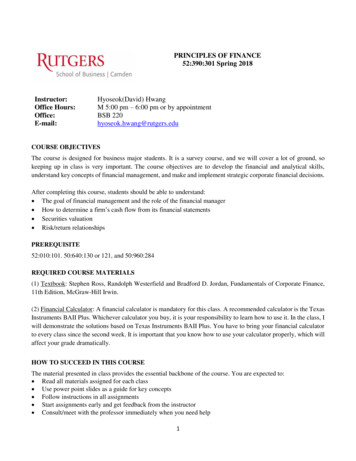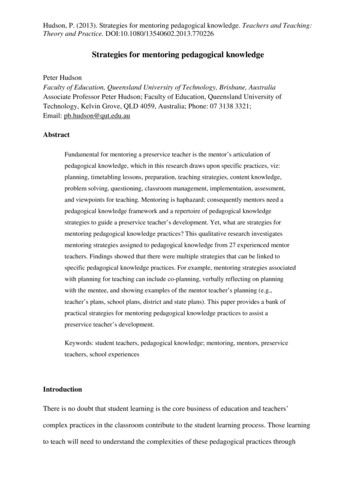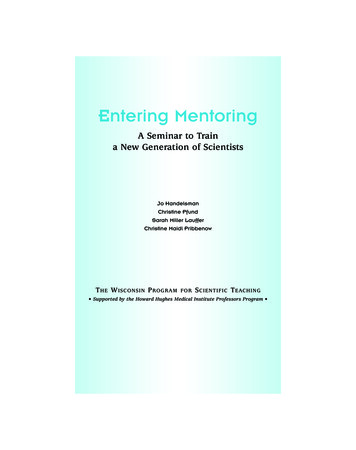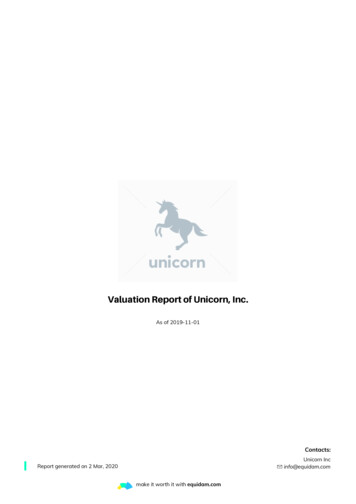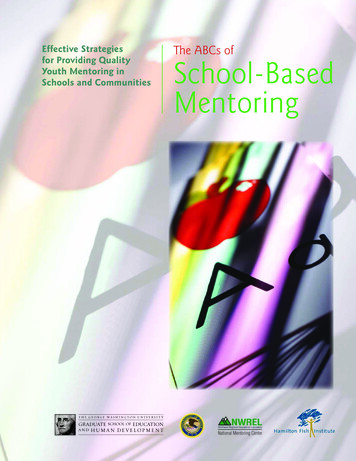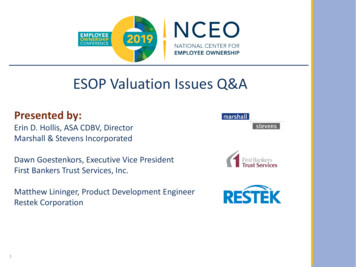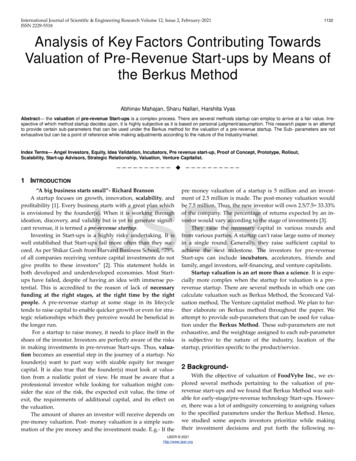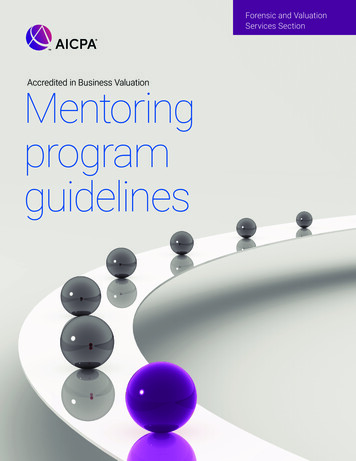
Transcription
Forensic and ValuationServices SectionAccredited in Business ValuationMentoringprogramguidelines
Contents2Welcome4 Mentoring guidelinesProgram objectivesHow the mentor program worksTopics for discussion6 Roles and responsibilitiesMentorProtégé8 Establishing the relationshipMentorProtégéForensic and Valuation Services — Accredited in Business Valuation mentoring program guidelines1
Dear protégé candidate:One of the many benefits of serving on the ABV CredentialCommittee is getting to know so many other valuationprofessionals from around the country. I have benefitedtremendously over the years from others who were willingto share their knowledge and experiences with me. The ABVCredential Committee helps other valuation professionalsmake these connections through the ABV Mentor Program.The program’s purpose is to help new and potential CPA/ABVs grow professionallyby developing relationships with more experienced CPA/ABVs willing to give someof their time back to the profession. It is an excellent program for CPAs lookingto enter the business valuation arena as well as CPA/ABVs who have beenpracticing for a few years and need some guidance for growing and expandingtheir practices.The ABV Credential Committee is committed to having a strong communityof CPA/ABVs with the tools and resources needed to be successful. The ABVMentor Program is a valuable resource that can make a significant difference inyour professional career. Therefore, we encourage you to sign up and activelyparticipate today.Best regards,Michelle Gallagher, CPA/ABV/CFFForensic and Valuation Services — Accredited in Business Valuation mentoring program guidelines2
Forensic and Valuation Services — Accredited in Business Valuation mentoring program guidelines3
MentoringguidelinesThe definition of a mentor is a trusted counseloror guide. A mentor has the ability to lead, inspireand motivate his or her protégé by expanding hisor her awareness, insight and perspective. Mentorsare a powerful force for developing successfulprofessionals. Scholars and business leaders agreethat every successful person needs a mentor.Program objectivesThe goal of the ABV Mentor Program is to provide away for AICPA members to learn about the businessvaluation profession, develop their professional skillsand better serve their clients through the help ofother more experienced and accomplished valuationprofessionals.Mentoring takes many forms, including the following:How the mentor program worksMentors and their protégés are carefully matchedby the ABV Mentor Task Force. The task force willcontact each program participant and provide themwith the profile of their prospective mentor/protégé.Protégés will make the initial contact with the mentor.We suggest mentors and protégés plan to meet, at aminimum, once a quarter for a one-hour conferencecall. More frequent brief meetings may take placedepending upon individual preferences, goals and byagreement of the mentor and protégé. T raditional one-on-one mentoring, either in a peerrelationship or a senior-to-junior relationship Network or group mentoring R adical mentoring, which is short-term andskill-focused Formal or informal mentoring“ While I am a relatively recent ABV, I’ve been writing appraisal reportsand making economic damage calculations for 20 years. I wantedassistance on staff development issues. There are no easy answersbut my mentor made useful suggestions and motivated me to seekout additional resources. This is a very valuable program. I workalone and benefited from learning about other practices.”Diane Lahti, CPA/ABV/CFF, MBAForensic and Valuation Services — Accredited in Business Valuation mentoring program guidelines4
Topics for discussionMentors and protégés will discuss ways to improveprofessionally.Some common subjects for conversation include: P ractice development and ways to improve clientrelations Employee/employer relations Management practices Application of common BV methods Guidance/recommendation on resources Contacts and referrals Goals and progress toward goalsThe ABV Mentor Program is notdesigned for offering/askingopinions regarding specific casesor engagements, nor is it intendedto be a report review service.However, if either participant wishesto hire/engage the services of thementor or protégé, then they shoulddo so under normal businessprotocols (i.e., engagement letter). Continuing education recommendations Networking Preparation for the ABV Examination G aining experience in the business valuationprofession G aining knowledge of the resources providedby the AICPA to the valuation professionForensic and Valuation Services — Accredited in Business Valuation mentoring program guidelines5
Roles and responsibilitiesMentorA mentor provides guidance and recommendationsto help the protégé develop his or her professionalskills and serves as a resource to the businessvaluation profession. A mentor also asks the toughquestions, communicates how the industry worksand assimilates the protégé into the businessvaluation field.QualificationsA mentor must have the following qualifications: ABV and member of the AICPA Credibility with colleagues and peers The respect of peers and other professionals Expertise in his or her field of knowledge A desire to help the protégé A willingness to commit time and energy tothe relationship Ability to help the protégé set and attain goalsResponsibilitiesTypical mentor responsibilities include, but are notlimited to: A cts as a resource for information about theprofession H elps the protégé develop new/improvedcapabilities in terms of skills and knowledgein order to reach important goals E stablishes trust with the protégé and maintainsconfidentiality Listens actively G ives guidance on how to become a CPA/ABV andstart and/or develop a BV practice I dentifies informative business valuation referencebooks and continuing education, includingresources provided by the AICPA to valuationprofessionals Challenges the protégé to think and analyze options Shares unique professional experiences Helps the protégé identify specific goals Serves as a sounding board for ideas Provides career guidance Provides vision and insight Offers support, advice and counsel P rovides encouragement for buildingself-confidence and stronger self-esteem Serves as a solid role model O ffers constructive and meaningful feedbackand critical analysisBenefitsFor mentors, the rewards of mentoring are thefollowing: T he personal satisfaction of giving back to theABV community A legacy of personal knowledge, insight andexperience P rofessional enhancement, higher visibilityand prestige Expansion of professional network“ There is so much to learn in businessvaluations that it is critical to have amentor. . I would recommend newABVs sign up and get with a mentorASAP to assist in developing a betterunderstanding of valuation topics.”Ike Braden, CPA/ABV, MBA, CFEForensic and Valuation Services — Accredited in Business Valuation mentoring program guidelines6
ProtégéThe ABV Mentor Program is designed primarily forthe benefit of the protégé. Therefore, the protégéwill assume the majority of the responsibility forthe quality of outcomes in a mentoring partnership.A protégé seeks constructive feedback as well asencouragement, and has a strong commitment toprofessional growth and the ambition to succeed.QualificationsA protégé must have: Openly share success and failures T ake advantage of opportunities presented by thementor professionals F ollow through on commitments and goals setduring the mentoring sessions H ave a personal vision, specific goals and a goodgrasp of his/her own reality Actively participate in the mentoring relationship AICPA membership Develop and utilize the skills of the profession Desire to learn the practice of business valuationBenefitsThe protégé gains the following benefits from beingmentored: Ambition to succeed S trong commitment to goals and personalresponsibility Ability to listen and follow through with directionsResponsibilitiesIt will be the protégé’s responsibility to: A ssistance in defining career goals, strategiesand options H elp in building confidence to grow beyond theusual expectations Make the initial contact with the mentor P ersonalized education geared toward specificneeds Schedule and initiate the quarterly phone meetings A sounding board for ideas and approaches E stablish the meeting agenda and send it to thementor prior to regular meetings R eferrals to experts with specialized industryknowledge Maintain confidentiality at all times Knowledge of continuing education programs Respect the mentor’s time R ecommendations for helpful valuation articlesand textsIn addition to the required procedures above, aprotégé must: Knowledge of the pathway to the ABV credential Be receptive to feedback and coaching Assess his or her individual needs“ My mentor has shared with me concepts, ideas and best practicesnot found in any valuation books. Without him, and the ABV MentorProgram, I would not have known how to get connected into the ABVcommunity nor would I have the experience or confidence in dealingwith many of the complex valuation issues we face today.”J. David Harper, CPA/ABV/PFSForensic and Valuation Services — Accredited in Business Valuation mentoring program guidelines7
Establishing the relationshipMentorTo prepare for your first meeting, you might want to: S ix months from now, how would you like to havegrown as a result of this mentoring relationship? S ummarize your goals and expectations for thementoring partnership W hat one thing can I do to ensure a positiveexperience for you in this relationship? Review your protégé’s profile and work experience W hat should I expect from you in this mentoringpartnership? A ddress logistics of quarterly meetings, i.e.,“How should we work together?”Next, interview your protégé. In preparation forthat first one-on-one meeting, review the interviewquestions below. Use these questions as a guidelineto help you begin to get to know your protégépersonally and professionally: What is important to you? What is your background and valuation experience? Which area have you practiced the most? W hat areas of business valuation would youlike to develop? W hat skills do you have with which you areconfident? W hich valuation courses have you taken, or planto take? Which valuation texts do you refer to most? How do you use these skills on the job? Which skills do you desire to develop? How can I help you develop these skills? What attracted you to this program?ProtégéTo prepare for your first meeting, you might want to: P repare an updated résumé and or a detailedsummary of your work experience Summarize your personal and professional goals I dentify your goals and expectation of the mentoringrelationship P repare a personal SWOT (strengths, weaknesses,opportunities and threats) analysis to help you andthe mentor determine on which areas to focus“ While the formal mentoringperiod may have ended, I stillconsider my mentor as my bestresource for questions andtechnical guidance.”Jacob McClellan, CPA/CITP/ABVForensic and Valuation Services — Accredited in Business Valuation mentoring program guidelines8
T: 888.777.7077 F: 800.362.5066 E: ABVMentor@aicpa.org W: aicpa.org/ABVMentor 2017 Association of International Certified Professional Accountants. All rights reserved. AICPA and American Institute of CPAs aretrademarks of the American Institute of Certified Public Accountants and are registered in the United States, European Union and othercountries. The design mark is a trademark of the Association of International Certified Professional Accountants. 22031-378
Forensic and Valuation Services Accredited in Business Valuation mentoring program guidelines 2 Dear protégé candidate: One of the many benefits of serving on the ABV Credential Committee is getting to know so many other valuation professionals from around the country. I have benefited tremendously over the years from others who were willing
